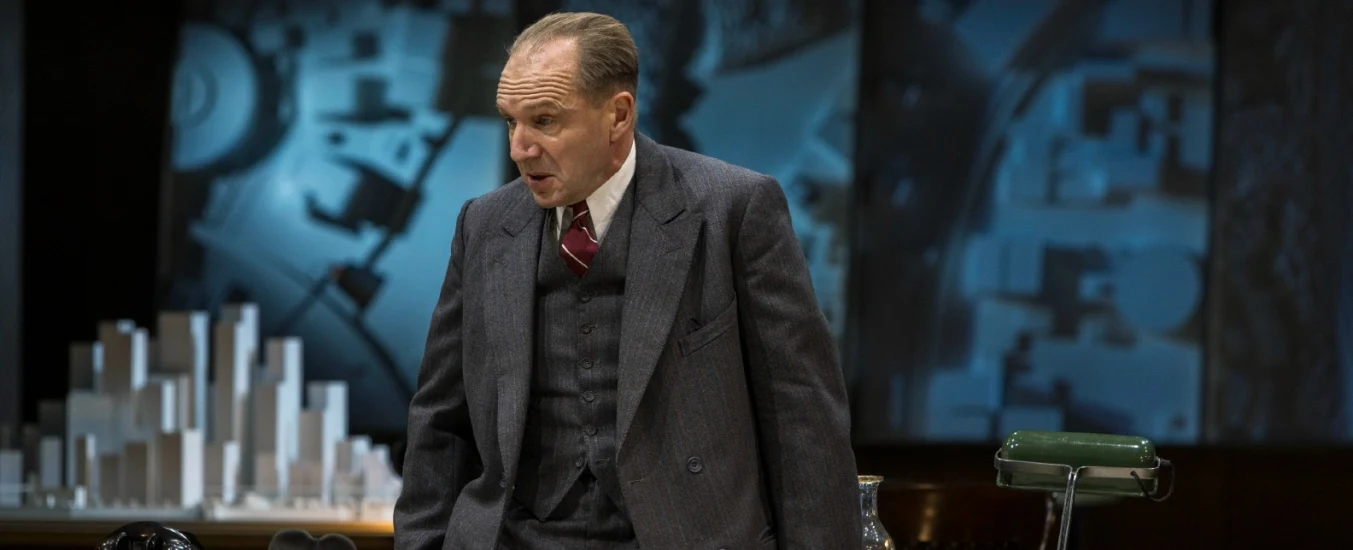
'Straight Line Crazy' review — Ralph Fiennes towers like a skyscraper over a flat play
On Straight Line Crazy's poster art, a pensive Ralph Fiennes towers above a diminutive New York skyline, in character as the notorious city planner Robert Moses. The image is an apt representation of the production. One can always count on Fiennes to deliver a riveting performance, but it's not quite enough to make David Hare's flat play as indelible as its subject matter.
Moses, as head of multiple planning committees in the 20th century, oversaw the building of numerous bridges, highways, parks, housing developments, and more. He's to thank for everything from the symphonic sounds at Lincoln Center to the perpetual congestion on the Cross Bronx Expressway. The play's first half shows him at his heyday, charming and strong-arming a snobbish Vanderbilt and a stubborn governor into supporting his plans for a highway to Jones Beach Park on Long Island.
The second act focuses on a rare failed project of Moses's: his plan to build a highway through Washington Square Park and replace the "slums" of Greenwich Village with upscale housing. Together, the two acts aim to show how his enterprising nature, once an asset, became his downfall when the public finally dared to defy him.
Hare is clearly inspired by The Power Broker, Robert Caro's incendiary 1977 biography that qualified Moses's many achievements with assertions that he used discriminatory and careless methods. (Many low-income "slums" Moses targeted for "cleanup" had populations of color.) Hare's play doesn't suggest that so much as knock audiences over the head with it, with lines like "Nowadays people don’t want to be told how to live, they want to choose how to live. And they have that right" and "You’re no different from anyone else, Mr Moses. Sometimes you’re right and sometimes you’re wrong."
Mariah Heller, a Black woman and Moses's new secretary, gets both these lines, along with an equally on-the-nose monologue about how Moses destroyed her Bronx neighborhood with the expressway. (Alisha Bailey acts the part well.) Whereas the characters in the first act feel like fleshed-out people, everyone is a mere mouthpiece for Hare's points by the second act. That's even true of Moses, who mostly condescends to the women on stage and off, and lists off his achievements ("achievements," if you will) as though dictating a textbook entry: "Countless slums destroyed, tenements gone, to be replaced by efficient, clean housing blocks, pleasing to the eye and hygienic for the purpose of living."
Fiennes manages to find the shades of emotion in a Moses written as little but bullish. The strongest moment is his final epilogue to the audience about his approach to swimming, the one skillful metaphor for Moses's career that parallels the play's opening lines.
Ultimately, more fascinating than the play itself are the ironies surrounding its New York debut at The Shed. Though itself a versatile and community-oriented venue, The Shed sits within the Hudson Yards complex, the epitome of the shiny yet vapid infrastructure the play's characters decry Moses for. And like most other things in Hudson Yards, Straight Line Crazy is expensive. Most seats (which are nearly sold out, by the way, save for limited same-day rush tickets) went for well over $100. Just as Moses made his highways and neighborhoods inaccessible to low-income populations — which, again, Straight Line Crazy condemns — the show effectively does the same. That includes those who rely on public transport, of which there is little near The Shed.
If nothing else, it's probably what Moses would have wanted.
Photo credit: Ralph Fiennes as Robert Moses in Straight Line Crazy at The Shed. (Photo by Kate Glicksberg)
Originally published on

